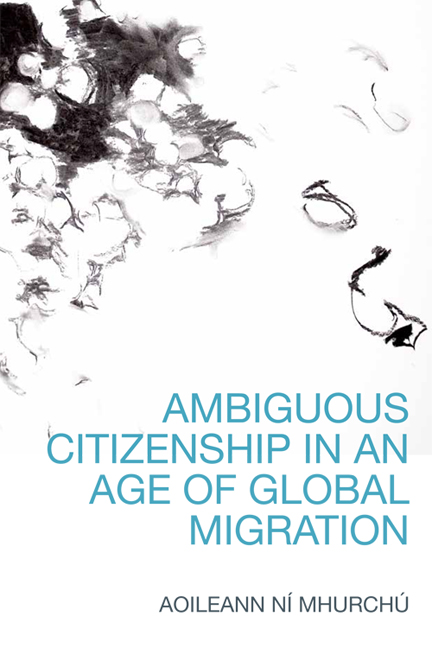Book contents
- Frontmatter
- Contents
- Acknowledgements
- Abbreviations
- Translations
- Introduction
- 1 Exploring the Citizenship Debate: The Sovereign Citizen-Subject
- 2 A Lens: The 2004 Irish Citizenship Referendum
- 3 Trapped in the Citizenship Debate: Sovereign Time and Space
- 4 Interrogating Sovereign Politics: An Alternative Citizen-Subject
- 5 Challenging the Citizenship Debate: Beyond State Sovereign Time and Space
- 6 Traces Rather than Spaces of Citizenship: Retheorising the Politics of Citizenship
- Conclusion
- Bibliography
- Index
6 - Traces Rather than Spaces of Citizenship: Retheorising the Politics of Citizenship
- Frontmatter
- Contents
- Acknowledgements
- Abbreviations
- Translations
- Introduction
- 1 Exploring the Citizenship Debate: The Sovereign Citizen-Subject
- 2 A Lens: The 2004 Irish Citizenship Referendum
- 3 Trapped in the Citizenship Debate: Sovereign Time and Space
- 4 Interrogating Sovereign Politics: An Alternative Citizen-Subject
- 5 Challenging the Citizenship Debate: Beyond State Sovereign Time and Space
- 6 Traces Rather than Spaces of Citizenship: Retheorising the Politics of Citizenship
- Conclusion
- Bibliography
- Index
Summary
What is at stake in opening up the conceptual understanding through which citizenship is currently thought from a metaphysics of presence (from the one and the-many-as-one) to a metaphysics of process (the less-than-one), as I have done in the preceding chapters of this book? How might that be useful for thinking about political identity and belonging in the future? How does it lead to a different theoretical practice in global politics? What does it mean for, and how does it relate to, a logic of dualistic and progressive temporal bordering? These are the questions which I attempt to address in this final chapter.
This chapter argues that the consequence of opening up the conceptual understanding from a metaphysics of presence to one of process is a new cartography of political life. The shift from assuming that temporality must be contained within absolute space to theorising fragmented time-space enables a move away from asking where boundaries are drawn between ‘us’ and ‘them’, inside and outside, citizen and migrant, the national and the international, towards focusing on the process(es) of boundarydrawing itself. It ‘encourages us to think about the lines that enable and are enabled by the distinctions made familiar’ by sovereign politics, rather than taking for granted that these can be ignored as ‘lines that do nothing at all’. We can begin to explore how political subjectivity need not be limited to being located within sovereign autonomous space, but can be understood as an ongoing process of drawing lines. Such a shift ultimately enables a reconceptualisation of the possibilities of what it means to be a citizen-subject; these are no longer limited to clearly bounded spaces experienced as ‘us’ or ‘them’, ‘inside’ or ‘outside’, ‘belonging’ or ‘not-belonging’, ‘present’ or ‘future’ – and movements simply across lines at the edges of these spaces. Citizenship can also be conceptualised as based upon the constant redrawing of lines: understood as a site of ‘encounters; a gathering; the forming of a sociality; a becoming; a remaking; or rewriting’. of a sociality; a becoming; a remaking; or rewriting’.
I outline the benefit of thinking about citizenship as ‘contingent trace’ from this alternative perspective. Thinking about citizenship in terms of trace, I argue, highlights its nature as a process, and underscores the ongoing fact of irregularity, fragmentation, contingency and disorder.
- Type
- Chapter
- Information
- Ambiguous Citizenship in an Age of Global Migration , pp. 190 - 219Publisher: Edinburgh University PressPrint publication year: 2014



